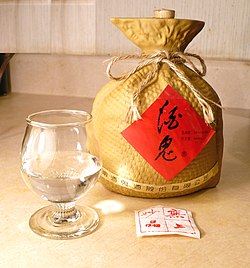
Back بايجيو ARZ Baijiu Catalan Siĕu-ciū CDO Paj-ťiou Czech Baijiu German Baijiu Spanish Baijiu Finnish Baijiu French באיג'יו HE Pajcsiu Hungarian
 A glass and bottle of “Jiugui” (酒鬼) brand baijiu | |||||||||||||||||||||||
| Type | Distilled beverage | ||||||||||||||||||||||
|---|---|---|---|---|---|---|---|---|---|---|---|---|---|---|---|---|---|---|---|---|---|---|---|
| Country of origin | China | ||||||||||||||||||||||
| Region of origin | East Asia | ||||||||||||||||||||||
| Alcohol by volume | 35–60% | ||||||||||||||||||||||
| Proof (US) | 70–120 | ||||||||||||||||||||||
| Color | Clear | ||||||||||||||||||||||
| Variants | light aroma, strong aroma, sauce aroma, rice aroma, phoenix aroma, mixed aroma, chi aroma, sesame aroma, medicine aroma, extra-strong aroma, special aroma, laobaigan, small qu baijiu | ||||||||||||||||||||||
| Related products | shōchū, soju, huangjiu, mijiu, sake | ||||||||||||||||||||||
| Chinese name | |||||||||||||||||||||||
| Chinese | 白酒 | ||||||||||||||||||||||
| Literal meaning | "white (clear) liquor" | ||||||||||||||||||||||
| |||||||||||||||||||||||
| Alternative Chinese name | |||||||||||||||||||||||
| Simplified Chinese | 烧酒 | ||||||||||||||||||||||
| Traditional Chinese | 燒酒 | ||||||||||||||||||||||
| Literal meaning | burning liquor | ||||||||||||||||||||||
| |||||||||||||||||||||||
Baijiu (Chinese: 白酒; pinyin: báijiǔ; lit. 'white (clear) liquor'), or shaojiu (simplified Chinese: 烧酒; traditional Chinese: 燒酒; pinyin: shāojiǔ; lit. 'burning liquor'), is a colorless Chinese liquor typically coming in between 35% and 60% alcohol by volume (ABV).[1][2] Each type of baijiu uses its own type of qū for fermentation to create a distinct and characteristic flavor profile.
Baijiu is a clear liquid usually distilled from fermented sorghum, although other grains may be used; some southeastern Chinese styles may employ rice and glutinous rice while other Chinese varieties may use wheat, barley, millet, or Job's tears (Chinese: 薏苡; pinyin: yìyǐ) in their mash bills. The qū starter culture used in the production of baijiu is usually made from pulverized wheat grain or steamed rice.[3][4][5][6][7][8][9]
Because of its clarity, baijiu can appear similar to several other East Asian liquors, e.g. Japanese shōchū (25%) or Korean soju (20–45%), but it often has a significantly higher alcohol content (35–60%).
- ^ "A Guide to Chinese Alcohol". Lost Laowai:China expat.
- ^ "The World's Most Consumed Alcohol Is One You Might Not Have Tried. But It's Coming to a Bar Near You". Time.
- ^ Zheng, Xiao-Wei; et al. (2011). "Daqu—A traditional Chinese liquor fermentation starter". Journal of the Institute of Brewing. 117 (1): 82–90. doi:10.1002/j.2050-0416.2011.tb00447.x.
- ^ Rong and Fa, Grandiose Survey of Chinese Alcoholic Drinks and Beverages, 2013, "Grandiose Survey of Chinese Alcoholic Drinks and Beverages". Archived from the original on July 29, 2014. Retrieved May 29, 2015.
- ^ Xiaoqing Mu et al. Solid-State Fermented Alcoholic Beverages, in Chen, Jian, and Yang Zhu, eds. Solid State Fermentation for Foods and Beverages. CRC Press, 2013.
- ^ Wang, H-Y.; et al. (2011). "Characterization and comparison of microbial community of different typical Chinese liquor Daqus by PCR–DGGE". Letters in Applied Microbiology. 53 (2): 134–140. doi:10.1111/j.1472-765x.2011.03076.x. PMID 21554340.
- ^ Zheng, Xiao-Wei, et al. "Complex microbiota of a Chinese " Fen" liquor fermentation starter ( Fen- Daqu), revealed by culture-dependent and culture-independent methods." Food microbiology 31.2 (2012): 293–300.
- ^ Xiong, X.; et al. (2014). "PCR-DGGE Analysis of the Microbial Communities in Three Different Chinese" Baiyunbian" Liquor Fermentation Starters". Journal of Microbiology and Biotechnology. 24 (8): 1088–95. doi:10.4014/jmb.1401.01043. PMID 24809292.
- ^ Liu, Huilin; Sun, Baoguo (2018). "Effect of Fermentation Processing on the Flavor of Baijiu". Journal of Agricultural and Food Chemistry. 66 (22): 5425–5432. Bibcode:2018JAFC...66.5425L. doi:10.1021/acs.jafc.8b00692. PMID 29751730.